Unit2 Water 第2课时 语法知识及拓展(课件)-2021-2022学年八年级英语下册同步备课系列(牛津上海版)
文档属性
| 名称 | Unit2 Water 第2课时 语法知识及拓展(课件)-2021-2022学年八年级英语下册同步备课系列(牛津上海版) |
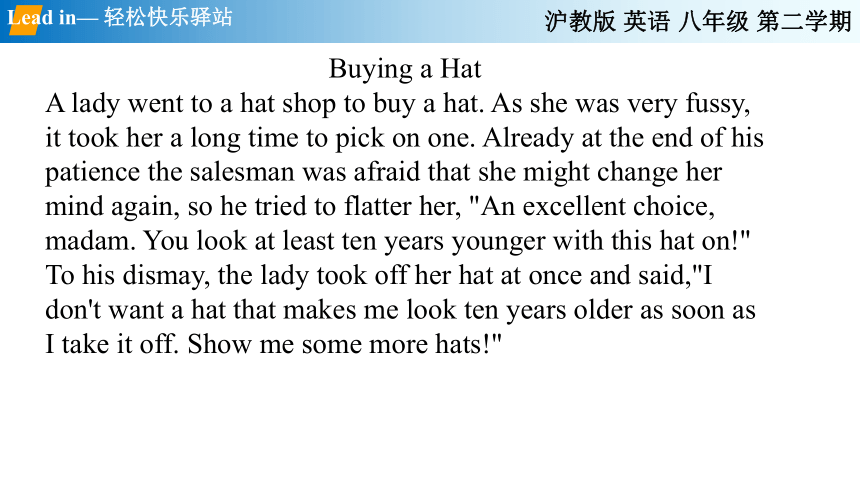
|
|
| 格式 | pptx | ||
| 文件大小 | 549.9KB | ||
| 资源类型 | 试卷 | ||
| 版本资源 | 牛津上海版(试用本) | ||
| 科目 | 英语 | ||
| 更新时间 | 2022-02-18 00:00:00 | ||
图片预览

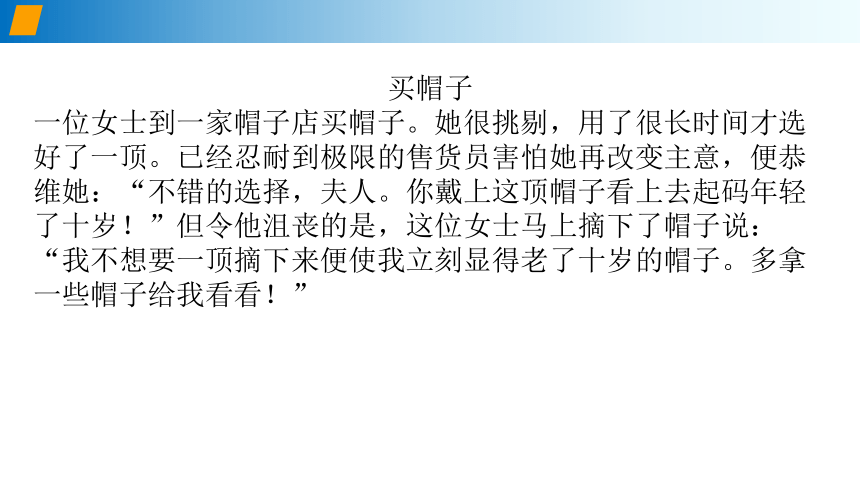
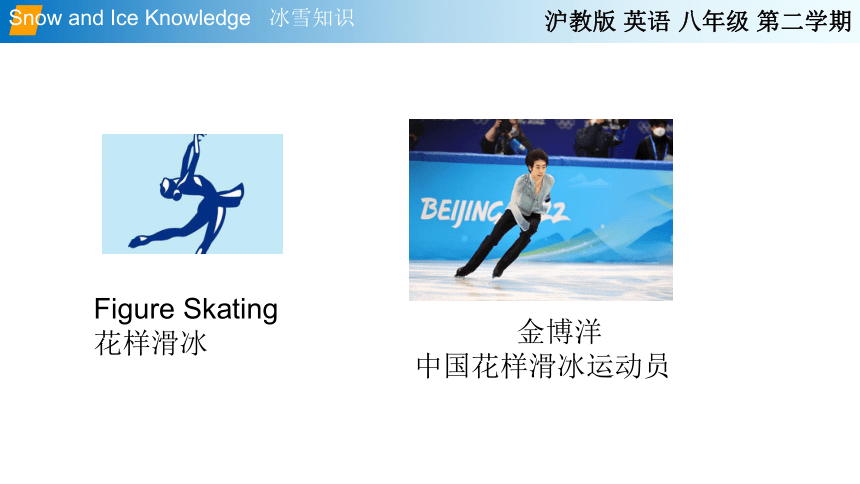

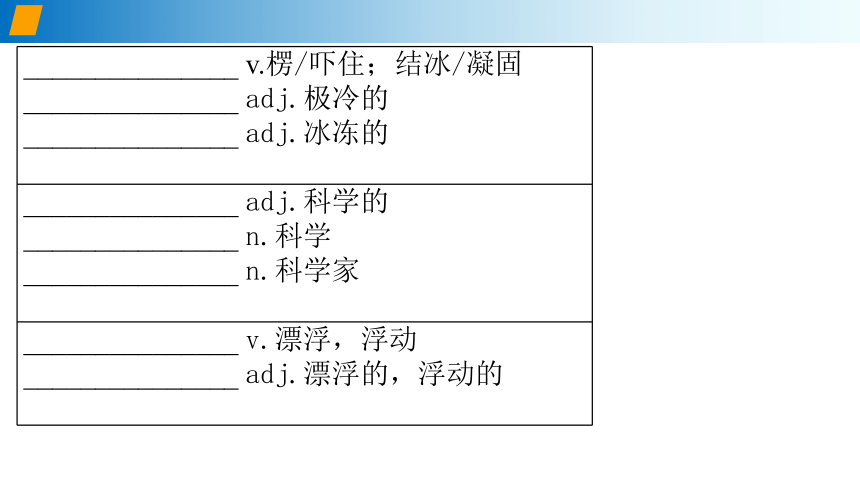
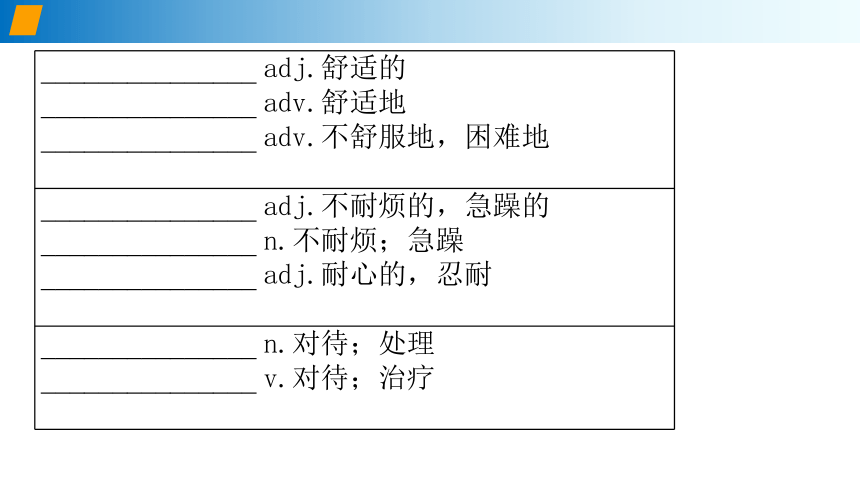
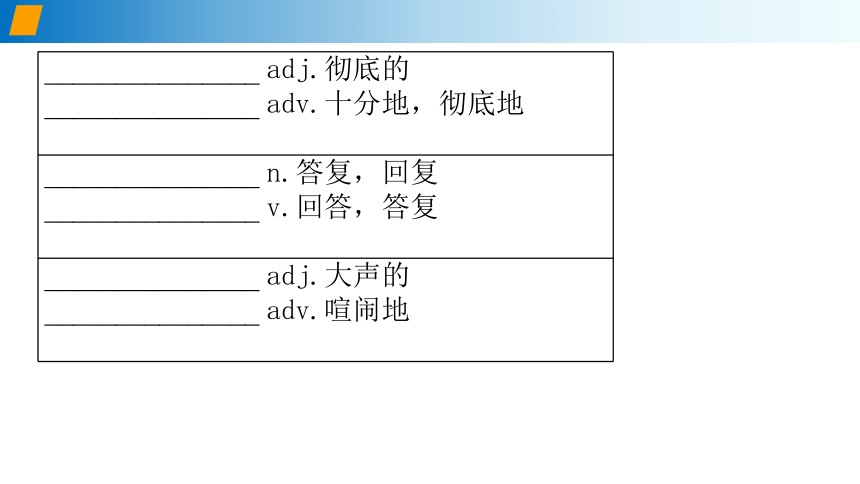

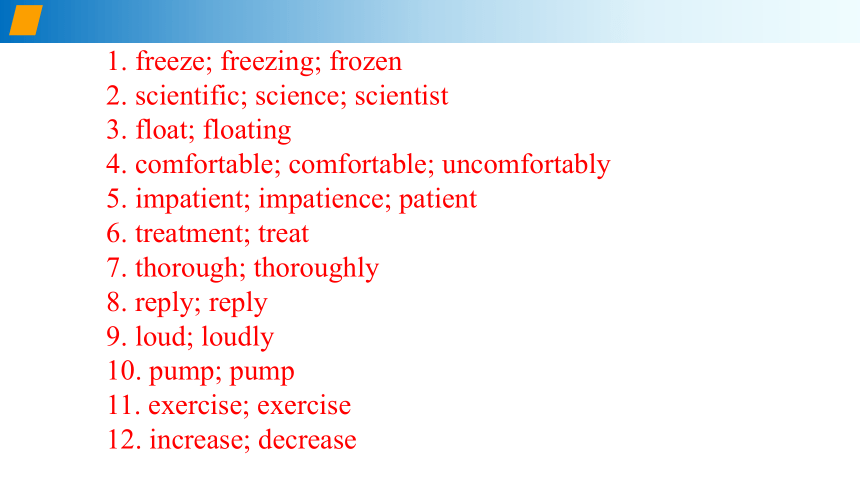
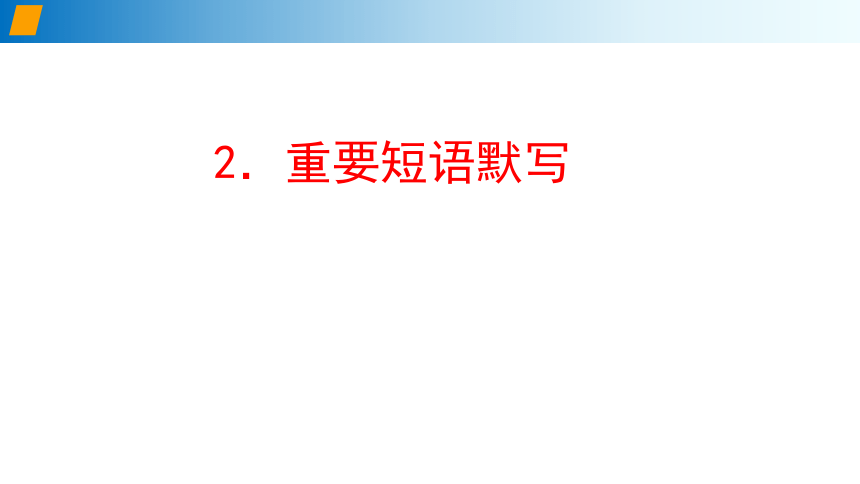
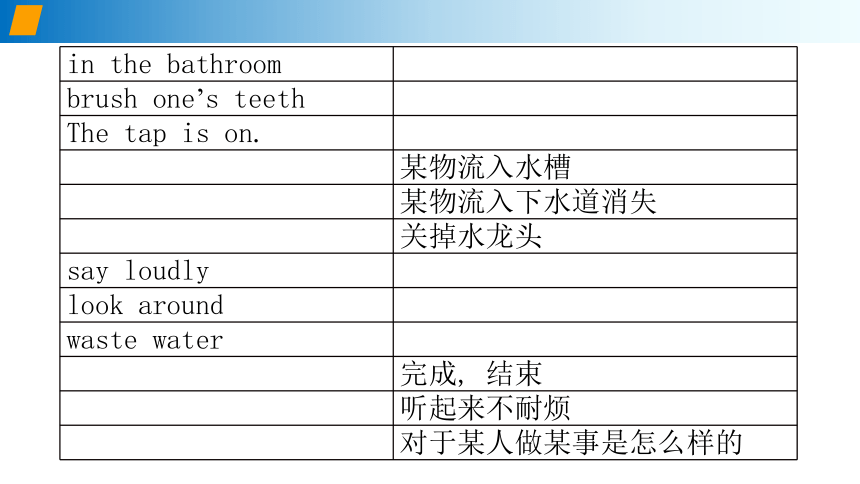
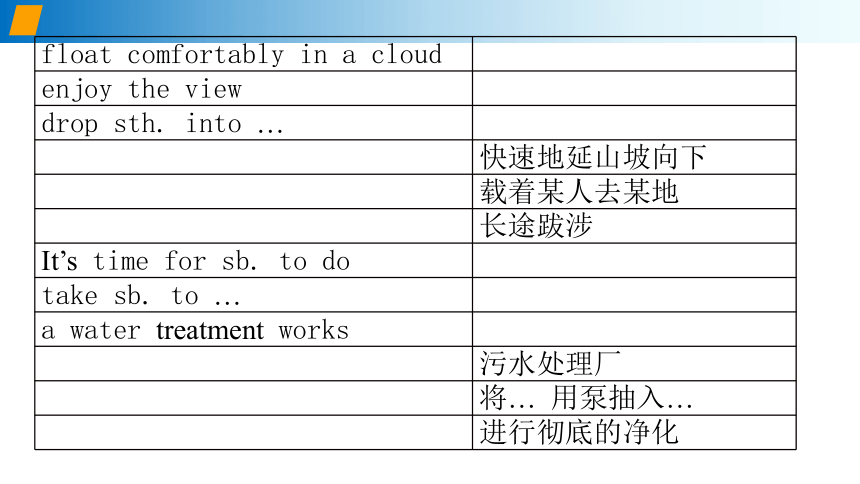
文档简介
(共32张PPT)
Lead in— 轻松快乐驿站
沪教版 英语 八年级 第二学期
Buying a Hat
A lady went to a hat shop to buy a hat. As she was very fussy, it took her a long time to pick on one. Already at the end of his patience the salesman was afraid that she might change her mind again, so he tried to flatter her, "An excellent choice, madam. You look at least ten years younger with this hat on!" To his dismay, the lady took off her hat at once and said,"I don't want a hat that makes me look ten years older as soon as I take it off. Show me some more hats!"
买帽子
一位女士到一家帽子店买帽子。她很挑剔,用了很长时间才选好了一顶。已经忍耐到极限的售货员害怕她再改变主意,便恭维她:“不错的选择,夫人。你戴上这顶帽子看上去起码年轻了十岁!”但令他沮丧的是,这位女士马上摘下了帽子说:“我不想要一顶摘下来便使我立刻显得老了十岁的帽子。多拿一些帽子给我看看!”
Snow and Ice Knowledge 冰雪知识
Figure Skating
花样滑冰
金博洋
中国花样滑冰运动员
沪教版 英语 八年级 第二学期
1. 单词默写
_______________ v.楞/吓住;结冰/凝固
_______________ adj.极冷的
_______________ adj.冰冻的
_______________ adj.科学的
_______________ n.科学
_______________ n.科学家
_______________ v.漂浮,浮动
_______________ adj.漂浮的,浮动的
_______________ adj.舒适的
_______________ adv.舒适地
_______________ adv.不舒服地,困难地
_______________ adj.不耐烦的,急躁的
_______________ n.不耐烦;急躁
_______________ adj.耐心的,忍耐
_______________ n.对待;处理
_______________ v.对待;治疗
_______________ adj.彻底的
_______________ adv.十分地,彻底地
_______________ n.答复,回复
_______________ v.回答,答复
_______________ adj.大声的
_______________ adv.喧闹地
_______________ v.抽,抽吸;打气
_______________ n.泵,水泵
_______________ v.运动,锻炼
_______________ n. 练习
_______________ v.增加
_______________ v.减少
1. freeze; freezing; frozen
2. scientific; science; scientist
3. float; floating
4. comfortable; comfortable; uncomfortably
5. impatient; impatience; patient
6. treatment; treat
7. thorough; thoroughly
8. reply; reply
9. loud; loudly
10. pump; pump
11. exercise; exercise
12. increase; decrease
2.重要短语默写
in the bathroom
brush one’s teeth
The tap is on.
某物流入水槽
某物流入下水道消失
关掉水龙头
say loudly
look around
waste water
完成, 结束
听起来不耐烦
对于某人做某事是怎么样的
float comfortably in a cloud
enjoy the view
drop sth. into …
快速地延山坡向下
载着某人去某地
长途跋涉
It’s time for sb. to do
take sb. to …
a water treatment works
污水处理厂
将… 用泵抽入…
进行彻底的净化
add some chemicals to ...
the end of the journey
be / come / get /go back
记得(不)要去做
等一会
你所谓的…是什么意思?
come from
talk to / with sb.
stop to dostop doing
开始做某事
清洗, 净化
至少
in the bathroom 在浴室里
brush one’s teeth 刷牙
The tap is on. 水龙头开着。
sth. pour into the sink 某物流入水槽
sth. vanish down the drain 某物流入下水道消失
turn the tap off=turn off the tap 关掉水龙头
say loudly 大声地说
look around 环顾
waste water 浪费水
finish with 完成, 结束
sound impatient 听起来不耐烦
It’s adj. for sb. to do sth. 对于某人做某事是怎么样的
float comfortably in a cloud 舒服地飘在云中
enjoy the view 欣赏风景
drop sth. into … 把…扔入…
speed down the mountain 快速地延山坡向下
carry sb. to … 载着某人去某地
travel a long way 长途跋涉
It’s time for sb. to do 到了某人做某事的时候了
take sb. to … 带某人去某地
a water treatment works 水处理厂
a sewage plant 污水处理厂
pump … into … 将… 用泵抽入…
give a thorough cleaning 进行彻底的净化
add some chemicals to ... 把一些化学品加入…
the end of the journey 旅途的终点
be / come / get /go back 回来
remember (not) to do 记得(不)要去做
wait a minute 等一会
What do you mean by ... . 你所谓的…是什么意思?
come from 来自…
talk to / with sb. 与某人谈话
stop to dostop doing 停止去做某事停止做某事
start doing / start to do 开始做某事
clean up 清洗, 净化
at least 至少
一、(a) few和(a) little的用法
Grammar
(a) few用在可数名词之前,(a) little用在不可数名词之前。
e. g. He took a few biscuits. (=several)他拿了几块饼干。
He took few biscuits. (= not many)他拿的饼干不多。
He took a little butter. (= some)他拿了点黄油。
He took little butter. (=not much)他拿的黄油不多。
2. few可由hardly any或almost no所取代,含否定的意味。
e. g.
The composition is well written; it has few(=hardly any) mistakes. 这篇作文写得很好,几乎没什么错误。
Few(=Almost no) men can solve it. 几乎没有人能解决它。
3. a few相当于some(several),含肯定的意味。
e.g. He has a few(=some or several) friends. 他有一些朋友。
4. a little和little之间的区别,就和a few和few的区别一样,只是(a) little需修饰不可数名词,表数量或程度。
e.g. He grows worse; there is little hope of his recovery. 他病情恶化了,恢复的希望很小了。
He is not much better, but there is a little hope. 他病情不是那么好,但是有点希望。
二、其他表示数量的词组用法
plenty of, a lot of, lots of均表许多,修饰复数可数名词或不可数名词。
e.g. The room contained plenty of/a lot of/lots of students. 这个教室容纳了许多学生。(复数名词)
The room contained plenty of/a lot of/lots of furniture. 这个教室容纳了许多家具。(不可数名词)
2. a great/a good/deal of, a large/a small/quantity of, a large/a small/amount of,均表数量,修饰不可数名词。
e.g.
The room contained a great deal of furniture. (不可数名词)
The room contained a good deal of furniture. (不可数名词)
The room contained a large quantity of furniture. (不可数名词)
The room contained a large amount of furniture. (不可数名词)
The room contained a small quantity of furniture. (不可数名词)
The room contained a small amount of furniture. (不可数名词)
3. a number of表示“许多;一些”;a great/large/good/number of表示“许多”,修饰复数可数名词,并且要与复数动词连用。
e.g. A number of books are missing from the library. 图书馆的许多图书丢失了。
The number of books from the library is large. 图书馆的图书数量很大。
the number of+复数名词+单数(be)动词
The room contained a great/large/good number of students.(复数可数名词)这个教室容纳了许多学生。
三、易错点名师点拨
【错因分析】 没有充分理解题意,不知道哪些词可以修饰不可数名词。
【例1】 -We have to be quick, the train starts at 10:35.
-Don't worry. There is__________time to go.
A. some B. few C. little D. any
【典型错误】 C
【正确答案】 A
【名师点拨】 该题想表达的是“不用着急,还有时间,来得及”。名词分为可数名词和不可数名词。不可数名词通常用much, little, a little, a bit of, plenty of等修饰;可数名词通常用many, few, a few, a number of等修饰。其中a little/a few指“很少”,表肯定意义;little/few指“几乎没有”,表否定意义。few和little的比较级分别为fewer和less。some, any, a lot of, lots of既可以修饰可数名词又可修饰不可数名词。some用于肯定句,any用于否定句和疑问句。但在一些表建议或意见的问句中仍然用some,表示希望得到对方的肯定回答。
【例2】 It is important__________English every day.
A. of us to read B. for us to read C. for us reading D. we must read
【典型错误】 A
【正确答案】 B
【名师点拨】 常见的用于It's+adj.+of sb. +to do sth. 句型的形容词有:kind, friendly, helpful, careful等。
【错因分析】 此题考查It's+adj.+of sb. +to do sth.与It's+adj. +for sb. +to do sth.两种句型的区别。一般It's+adj. +of sb. to do sth. 是对人的品格的评论。而It's+adj. +for sb. +to do sth.是对做什么事情的评论。在第一个句型中,一般用表述人的性格或品质的形容词。
【例3】 Would you like__________me with my homework
A. helping B.to helping C. to help D. help
【典型错误】 B
【正确答案】 C
【名师点拨】 would like之后只能接动词不定式,即would like to do sth.。要注意它与like及由like构成的其他短语的用法区别。如:like to do, like doing, feel like doing。
【错因分析】 不清楚would like的用法。
【例4】 I think it__________in two days.
A. rained B.will rain C. is raining D. has rained
【典型错误】 C
【正确答案】 B
【名师点拨】 题意为“未来两天内会有雨”一般将来时态表示动作发生在将来,其结构常见的有三种,如:will+动词原形,be going to do,某些动词的进行时态be+doing。与一般将来时连用的时间状语有in十一段时间,tomorrow,next…,this afternoon等。
【错因分析】 把将来会发生的情况视为正在发生的情况。
愿君皆有所获,皆有所得
Lead in— 轻松快乐驿站
沪教版 英语 八年级 第二学期
Buying a Hat
A lady went to a hat shop to buy a hat. As she was very fussy, it took her a long time to pick on one. Already at the end of his patience the salesman was afraid that she might change her mind again, so he tried to flatter her, "An excellent choice, madam. You look at least ten years younger with this hat on!" To his dismay, the lady took off her hat at once and said,"I don't want a hat that makes me look ten years older as soon as I take it off. Show me some more hats!"
买帽子
一位女士到一家帽子店买帽子。她很挑剔,用了很长时间才选好了一顶。已经忍耐到极限的售货员害怕她再改变主意,便恭维她:“不错的选择,夫人。你戴上这顶帽子看上去起码年轻了十岁!”但令他沮丧的是,这位女士马上摘下了帽子说:“我不想要一顶摘下来便使我立刻显得老了十岁的帽子。多拿一些帽子给我看看!”
Snow and Ice Knowledge 冰雪知识
Figure Skating
花样滑冰
金博洋
中国花样滑冰运动员
沪教版 英语 八年级 第二学期
1. 单词默写
_______________ v.楞/吓住;结冰/凝固
_______________ adj.极冷的
_______________ adj.冰冻的
_______________ adj.科学的
_______________ n.科学
_______________ n.科学家
_______________ v.漂浮,浮动
_______________ adj.漂浮的,浮动的
_______________ adj.舒适的
_______________ adv.舒适地
_______________ adv.不舒服地,困难地
_______________ adj.不耐烦的,急躁的
_______________ n.不耐烦;急躁
_______________ adj.耐心的,忍耐
_______________ n.对待;处理
_______________ v.对待;治疗
_______________ adj.彻底的
_______________ adv.十分地,彻底地
_______________ n.答复,回复
_______________ v.回答,答复
_______________ adj.大声的
_______________ adv.喧闹地
_______________ v.抽,抽吸;打气
_______________ n.泵,水泵
_______________ v.运动,锻炼
_______________ n. 练习
_______________ v.增加
_______________ v.减少
1. freeze; freezing; frozen
2. scientific; science; scientist
3. float; floating
4. comfortable; comfortable; uncomfortably
5. impatient; impatience; patient
6. treatment; treat
7. thorough; thoroughly
8. reply; reply
9. loud; loudly
10. pump; pump
11. exercise; exercise
12. increase; decrease
2.重要短语默写
in the bathroom
brush one’s teeth
The tap is on.
某物流入水槽
某物流入下水道消失
关掉水龙头
say loudly
look around
waste water
完成, 结束
听起来不耐烦
对于某人做某事是怎么样的
float comfortably in a cloud
enjoy the view
drop sth. into …
快速地延山坡向下
载着某人去某地
长途跋涉
It’s time for sb. to do
take sb. to …
a water treatment works
污水处理厂
将… 用泵抽入…
进行彻底的净化
add some chemicals to ...
the end of the journey
be / come / get /go back
记得(不)要去做
等一会
你所谓的…是什么意思?
come from
talk to / with sb.
stop to dostop doing
开始做某事
清洗, 净化
至少
in the bathroom 在浴室里
brush one’s teeth 刷牙
The tap is on. 水龙头开着。
sth. pour into the sink 某物流入水槽
sth. vanish down the drain 某物流入下水道消失
turn the tap off=turn off the tap 关掉水龙头
say loudly 大声地说
look around 环顾
waste water 浪费水
finish with 完成, 结束
sound impatient 听起来不耐烦
It’s adj. for sb. to do sth. 对于某人做某事是怎么样的
float comfortably in a cloud 舒服地飘在云中
enjoy the view 欣赏风景
drop sth. into … 把…扔入…
speed down the mountain 快速地延山坡向下
carry sb. to … 载着某人去某地
travel a long way 长途跋涉
It’s time for sb. to do 到了某人做某事的时候了
take sb. to … 带某人去某地
a water treatment works 水处理厂
a sewage plant 污水处理厂
pump … into … 将… 用泵抽入…
give a thorough cleaning 进行彻底的净化
add some chemicals to ... 把一些化学品加入…
the end of the journey 旅途的终点
be / come / get /go back 回来
remember (not) to do 记得(不)要去做
wait a minute 等一会
What do you mean by ... . 你所谓的…是什么意思?
come from 来自…
talk to / with sb. 与某人谈话
stop to dostop doing 停止去做某事停止做某事
start doing / start to do 开始做某事
clean up 清洗, 净化
at least 至少
一、(a) few和(a) little的用法
Grammar
(a) few用在可数名词之前,(a) little用在不可数名词之前。
e. g. He took a few biscuits. (=several)他拿了几块饼干。
He took few biscuits. (= not many)他拿的饼干不多。
He took a little butter. (= some)他拿了点黄油。
He took little butter. (=not much)他拿的黄油不多。
2. few可由hardly any或almost no所取代,含否定的意味。
e. g.
The composition is well written; it has few(=hardly any) mistakes. 这篇作文写得很好,几乎没什么错误。
Few(=Almost no) men can solve it. 几乎没有人能解决它。
3. a few相当于some(several),含肯定的意味。
e.g. He has a few(=some or several) friends. 他有一些朋友。
4. a little和little之间的区别,就和a few和few的区别一样,只是(a) little需修饰不可数名词,表数量或程度。
e.g. He grows worse; there is little hope of his recovery. 他病情恶化了,恢复的希望很小了。
He is not much better, but there is a little hope. 他病情不是那么好,但是有点希望。
二、其他表示数量的词组用法
plenty of, a lot of, lots of均表许多,修饰复数可数名词或不可数名词。
e.g. The room contained plenty of/a lot of/lots of students. 这个教室容纳了许多学生。(复数名词)
The room contained plenty of/a lot of/lots of furniture. 这个教室容纳了许多家具。(不可数名词)
2. a great/a good/deal of, a large/a small/quantity of, a large/a small/amount of,均表数量,修饰不可数名词。
e.g.
The room contained a great deal of furniture. (不可数名词)
The room contained a good deal of furniture. (不可数名词)
The room contained a large quantity of furniture. (不可数名词)
The room contained a large amount of furniture. (不可数名词)
The room contained a small quantity of furniture. (不可数名词)
The room contained a small amount of furniture. (不可数名词)
3. a number of表示“许多;一些”;a great/large/good/number of表示“许多”,修饰复数可数名词,并且要与复数动词连用。
e.g. A number of books are missing from the library. 图书馆的许多图书丢失了。
The number of books from the library is large. 图书馆的图书数量很大。
the number of+复数名词+单数(be)动词
The room contained a great/large/good number of students.(复数可数名词)这个教室容纳了许多学生。
三、易错点名师点拨
【错因分析】 没有充分理解题意,不知道哪些词可以修饰不可数名词。
【例1】 -We have to be quick, the train starts at 10:35.
-Don't worry. There is__________time to go.
A. some B. few C. little D. any
【典型错误】 C
【正确答案】 A
【名师点拨】 该题想表达的是“不用着急,还有时间,来得及”。名词分为可数名词和不可数名词。不可数名词通常用much, little, a little, a bit of, plenty of等修饰;可数名词通常用many, few, a few, a number of等修饰。其中a little/a few指“很少”,表肯定意义;little/few指“几乎没有”,表否定意义。few和little的比较级分别为fewer和less。some, any, a lot of, lots of既可以修饰可数名词又可修饰不可数名词。some用于肯定句,any用于否定句和疑问句。但在一些表建议或意见的问句中仍然用some,表示希望得到对方的肯定回答。
【例2】 It is important__________English every day.
A. of us to read B. for us to read C. for us reading D. we must read
【典型错误】 A
【正确答案】 B
【名师点拨】 常见的用于It's+adj.+of sb. +to do sth. 句型的形容词有:kind, friendly, helpful, careful等。
【错因分析】 此题考查It's+adj.+of sb. +to do sth.与It's+adj. +for sb. +to do sth.两种句型的区别。一般It's+adj. +of sb. to do sth. 是对人的品格的评论。而It's+adj. +for sb. +to do sth.是对做什么事情的评论。在第一个句型中,一般用表述人的性格或品质的形容词。
【例3】 Would you like__________me with my homework
A. helping B.to helping C. to help D. help
【典型错误】 B
【正确答案】 C
【名师点拨】 would like之后只能接动词不定式,即would like to do sth.。要注意它与like及由like构成的其他短语的用法区别。如:like to do, like doing, feel like doing。
【错因分析】 不清楚would like的用法。
【例4】 I think it__________in two days.
A. rained B.will rain C. is raining D. has rained
【典型错误】 C
【正确答案】 B
【名师点拨】 题意为“未来两天内会有雨”一般将来时态表示动作发生在将来,其结构常见的有三种,如:will+动词原形,be going to do,某些动词的进行时态be+doing。与一般将来时连用的时间状语有in十一段时间,tomorrow,next…,this afternoon等。
【错因分析】 把将来会发生的情况视为正在发生的情况。
愿君皆有所获,皆有所得
